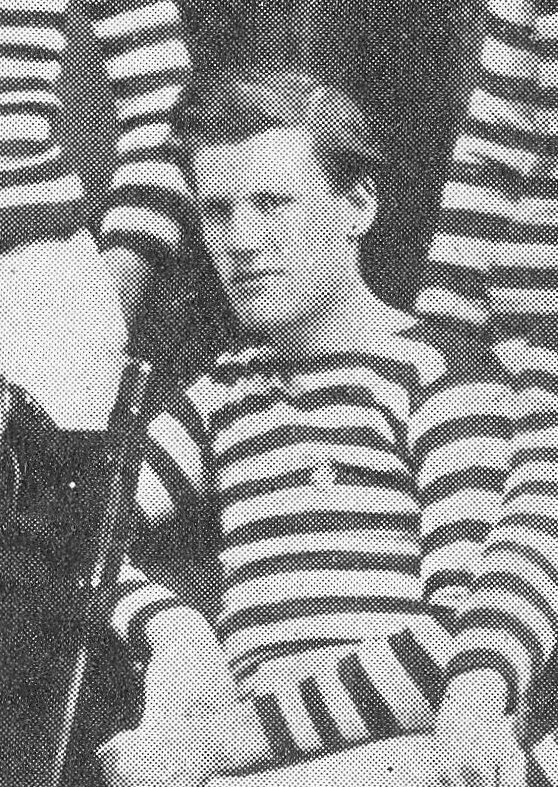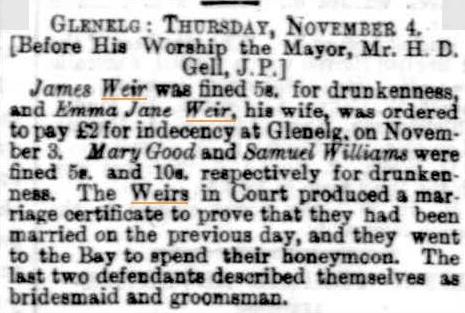Archie Hunter, a star with Aston Villa in the 1880s, wrote a series of reminiscences in which he described a drunken episode which ended with Weir being hailed as the hero of a major fire in Glasgow’s south side.
Weir was capped four times by Scotland, including the first ever international in 1872, and won the Scottish Cup three times with Queen’s Park. He was known as the ‘Prince of Dribblers’, an accolade which Hunter said was fully deserved: “I think he was the best forward in Scotland, and when he once got possession of the ball no one could take it from him. If you could have seen him play you would have remembered it. He was a merry fellow, always ready for fun and when the game was over no one liked a frolic better than he did.”
Hunter recalled a night out in Glasgow which would not be out of place among today’s footballers: “A few of us were going home together and Jimmy Weir was in a fine rollicking mood. He had been – well, celebrating a victory that day – and he was amusing us with his little pranks and his livery chatter. We were all in the best of spirits and made a merry little party.
“All at once we were startled by a loud alarm in the street and a cry of Fire! Fire! The people, excited as they always are on such occasions, began to run in the direction indicated by a red glare in the distance and we followed them. Sure enough a house was on fire and the flames were getting a firm hold on the building. Worse than that, there were people in the house and already there was such a blaze that they found it hard to make their way to the doors.
“Presently, amid all the smoke and flame we saw a face at one of the topmost windows – a face that looked ghastly in the glare and was full of horror and despair. There were no ladders at hand and the lower part of the building was ablaze. It looked as if the poor creature – whether man or woman we could not distinguish – must be burnt to death in that furnace.
“Well, Jimmy was a carpenter by trade and I suppose he knew something about climbing up and down houses. What did he do but coolly commence to climb up a high wall, from which he could throw a rope to the poor creature who was in such terrible danger. We watched him go up and before very long – though it seemed a long time then – he managed to bring the poor thing down; and how he was cheered by the people to be sure! His heroism wasn’t soon forgotten.”
It is a fascinating story, and what is more it is entirely true. I recently stumbled across a report of the incident in the Glasgow Herald of 26 February 1877.
Shortly after 12 on Saturday night, a serious fire occurred at No Man’s Land, whereby a fine tenement of shops and dwelling houses was burned, the furniture and fittings destroyed, and the lives of the occupants placed in imminent danger. The tenement was situated at the corner of Winton Terrace (Victoria Road) and Allison Street, with a frontage to each thoroughfare of about 90 feet, and was four storeys in height. The ground flat was occupied as shops – a general store, conducted on the American principle and carried on by Mr James Graham, and a fruiterer’s and two drapers’ premises. The flats above, which were divided into dwellings of four rooms and kitchen, and five rooms and kitchen, were fully occupied by five families. The fire originated in Mr Graham’s store, whence it spread with great rapidity.
The report explained how residents were alerted by the local police sergeant, Mr Taylor, who climbed the tenement stairs to the top level, shouting ‘Fire’ as he went. But he was not alone:
Mr Weir, well known in football circles, also lent admirable assistance in making the inmates aware of the alarming position in which they were placed – a task which was not accomplished without considerable difficulty. When there were still a number of persons within the building, the flames had burst into the lobby, but Taylor and Mr Weir succeeded in penetrating through them and a second time reaching the upper flats, where were found a number of people in a terror-stricken state. It was impossible to reach the street through the lobby.
Fortunately, a balcony ran along the front of the second storey, and the sergeant at once stepped on to the balcony, and passing along to the south end he saw that if the parties could be landed on the window sill of a house in the adjoining tenement they would be safe. By a loud knocking on the window he attracted the attention of a young man who was within, and by his aid got the window opened.
Nobody was killed but the tenement was destroyed which is why the building now on that site in Victoria Road is a different style to the rest of the street. The paper praised the efforts of the rescuers: “There seemed throughout a generous resignation of self”.
On the day of the rescue, Weir and Hunter had both played for the ‘Improbables’ in the Scotland international trial, which their team won 3-0; the match report in the Herald was on the opposite page to the story of the fire.
Weir’s life was certainly not lacking in drama. In 1881 he emigrated to Australia, a course that would eventually lead to his death in the outback eight years later, a story I outlined in my book First Elevens. The death notice was in the Adelaide Advertiser:
WEIR.—On the 23rd April, at Warrina Hospital, Great Northern Extension Railway, after an illness of 3 weeks and 3 days, James Biger Weir, of typhoid fever and congestion of the lungs. Deeply regretted by his wife.
When the book came out, I did not know the identity of his wife but have since discovered her name - and that leads to another tale. They married in Adelaide on 3 November 1886, and the reason I know is that they celebrated rather too much:
James Weir was her third husband, and she wasted no time in finding a fourth as she married a Thomas Neylon less than two months after Weir’s death. There are reports through the 1890s of Emma Neylon being fined for drunkenness but she must have sobered up eventually as in 1907 she married her fifth husband and lived until 1937.
James Biggar Weir
Born 21 October 1851 in Gorbals, Glasgow.
Died 23 April 1889 at Warrina, South Australia.


 RSS Feed
RSS Feed